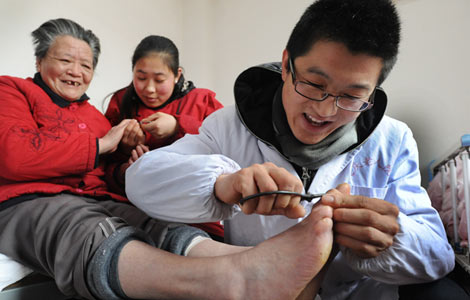China reviews bill to ease one-child policy
Updated: 2013-12-23 19:35
(Xinhua)
|
||||||||
BEIJING -- A bill was tabled for reading by the top legislature Monday, which seeks to allow couples to have two children if either of them is an only child.
The State Council, or China's cabinet, submitted a bill to adjust the country's family planning policy to the bi-monthly session of the Standing Committee of the National People's Congress (NPC), which runs Monday to Saturday.
The State Council argued the need to adjust the family planning policy in the face of a steadily declining birth rate and changing demographic structure.
China's birth rate has remained relatively low and showed a tendency for further reduction. The rate has dropped to between 1.5 and 1.6 since the 1990s, which means one Chinese woman of child-bearing age gives birth to 1.5 to 1.6 children on average, according to the bill.
"If China continues the current family planning policy, the birth rate would continue reducing and lead to a sharp drop of the total population after reaching the peak," said Li Bin, minister in charge of the National Health and Family Planning Commission, when elaborating the bill to lawmakers.
The country's working population began to drop in 2012 by 3.45 million annually, and it is likely to reduce by 8 million annually after 2023, according to the bill.
The population aged 60 and above will reach 400 million and account for one-fourth of the total population in the early 2030s, up from one-seventh now.
To adapt to the new circumstances and meet people's expectations, the country has to adjust its family planning policies, Li said.
"It is the right time to do it as the low birth rate is stable, the working population is still large and the burden to support the elderly is relatively light," she said.
The policy adjustment now will also pave the way for the country to allow all couples to have two children when conditions are ready, she added.
The State Council suggested that provincial people's congresses and their standing committees amend local family planning regulations or adopt special acts after careful evaluation of local demographic situations and risks of policy changes, the bill said.

 A return to motherhood at 60
A return to motherhood at 60
 AK-47 inventor Mikhail Kalashnikov dies
AK-47 inventor Mikhail Kalashnikov dies
 Oil spill from Qingdao blast kills sea life
Oil spill from Qingdao blast kills sea life
 Ice storm hits Toronto
Ice storm hits Toronto
 A man and a child jump off Manhattan building
A man and a child jump off Manhattan building
 Male nurses in demand as caregivers for elderly
Male nurses in demand as caregivers for elderly
 Moving beyond language skills
Moving beyond language skills
 Khodorkovsky says he will not enter Russian politics
Khodorkovsky says he will not enter Russian politics
Most Viewed
Editor's Picks

|

|

|

|

|

|
Today's Top News
China's top 10 scandals in 2013
LA Winds blow into China
Private clubs are targeted by anti-graft campaign
China makes it easier to sue government
China promotes core socialist values
China deliberates adjusting one-child policy
Washington tries to shift spying blame to China
Swift justice urged for murder case
US Weekly

|

|








